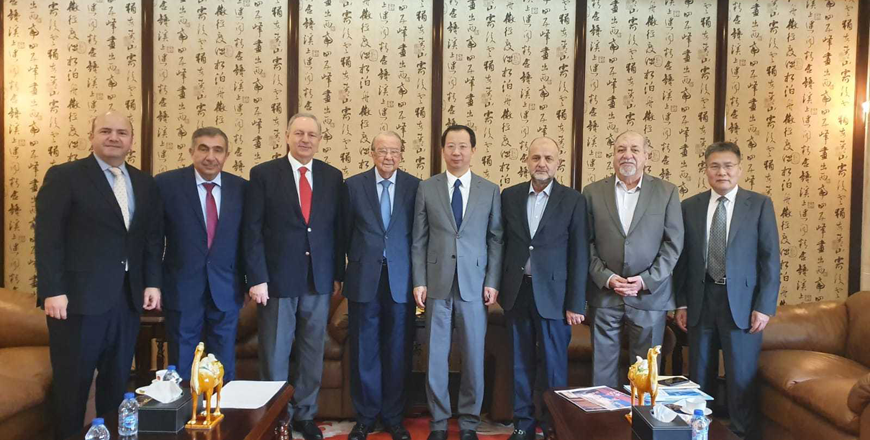You are here
Cooperation between Jordan, China dates back over 2,000 years – Jordanian envoy in Beijing
By Heba Elayyan - Sep 14,2024 - Last updated at Sep 15,2024

Jordan’s Ambassador to China Hussam Husseini during recent interview with The Jordan Times in Beijing (Photo by Ilham Darwazeh)
BEIJING — Cooperation between Jordan and China dates back over 2,000 years, with the ancient Kingdom of Petra serving as a major hub on the Silk Road, Jordan’s Ambassador to China Hussam Husseini said.
In a recent interview with The Jordan Times in Beijing, Husseini stressed that the historical significance of Petra laid the foundation for a long-standing relationship between the two nations, one built on mutual respect for civilization and cultural heritage.
This "deep-rooted" connection, according to the ambassador, continues to shape modern diplomatic engagement between Jordan and China.
Reflecting on the broader relationship, Husseini explained how both nations, as ancient civilizations, have been key contributors to global human development.
He noted that China’s civilization dates back to around 5,000 BC, while Jordan’s Arab heritage also spans millennia. Their influence on cultural, intellectual, and trade exchanges has left a permanent mark on world history, which continues to inspire their modern strategic partnerships.
Turning to the 20th century, Husseini drew comparisons between the pivotal transformations that Jordan and China underwent. In 1921, Jordan saw the establishment of the Hashemite kingdom, while China marked the founding of the Chinese Communist Party.
Both nations emerged from difficult political and economic circumstances to become modern states. Under the leadership of the Communist Party, China rose to be a global economic force, while Jordan, under the Hashemite monarchy, has preserved its rich heritage and established a contemporary state.
Despite the differences in achievements scale and global influence, Husseini remarked that both countries have successfully navigated challenges and continue to thrive.
Husseini pointed out that Jordan’s role in fostering Arab-Chinese dialogue began in 1983, not in 2013 as commonly believed. The Arab-Chinese Cooperation Programme, initiated under Jordanian leadership, has created an enduring platform for cultural and intellectual exchange between the two regions.
As economic cooperation between Jordan and China has deepened, China has become Jordan’s second-largest trading partner. Husseini stressed the importance of this relationship, noting that Jordan’s position as a mediator between Arab countries and China has been solidified through consistent dialogue and partnerships.
The Belt and Road Initiative (BRI) has further enhanced these ties, with Jordan’s strategic location and resources positioning it as a potential regional hub for Chinese economic interests.
"Jordan was one of the first to support the BRI," Husseini said, adding that Aqaba stands as a critical node in both land and sea routes, offering a gateway for China’s commerce in the Middle East.
He also noted how the COVID-19 pandemic exposed vulnerabilities in global supply chains, underscoring the importance of Jordan’s logistical and manufacturing capacities in stabilising future trade.
Jordan’s natural resources, particularly its silicon reserves, are another area of potential collaboration with China.
These reserves are crucial for industries like solar energy and electronics manufacturing, areas in which Jordan and China could further expand their partnership, especially as both countries focus on renewable energy solutions.
Husseini praised Jordan’s skilled workforce, particularly in the area of digital technology.
Jordanian talents have become a valued resource for Chinese companies operating across the Arab world.
"Our youth, particularly in the fields of digital technologies, are highly regarded and often employed by Chinese firms for regional operations," he said.
This, the diplomat suggested, could further enhance Jordan’s role in bolstering Arab-Chinese relations, particularly in emerging sectors like artificial intelligence and technology.
China’s interest in Jordan’s natural resources is evident in its investment in Jordan’s potash sector.
"The largest non-Jordanian investor in our potash company is a Chinese firm," Husseini said.
This partnership reflects China’s broader strategy to secure resources essential for its expanding industries, and Jordan has emerged as a critical partner in this effort, he added.
Husseini praised His Majesty King Abdullah’s leadership and vision for fostering strong diplomatic relations between Jordan and China. The multiple visits by King Abdullah to China have helped boost the bond between the two nations and ensure continued collaboration.
As he approaches five years of service in China, Husseini remains optimistic about the future of Jordan-China relations.
He believes that the shared history of the two ancient civilizations, combined with their growing economic and cultural ties, lays the groundwork for a promising future.
"There is still much more we can achieve together," Husseini said, adding that Jordan’s strategic location, resources, and human capital, alongside China’s economic power, create significant opportunities for deeper cooperation.
In his view, the future of this relationship will be shaped by the ability of both nations to leverage these assets while addressing global challenges and building on a partnership that has been forged over millennia.
Related Articles
AMMAN — Hamdi Al Tabbaa, president of the Jordan Businessmen Association, and Chinese Ambassador to the Kingdom Chen Chuandong met on Wednes
AMMAN — Jordan and China on Friday discussed enhancing economic cooperation, the Jordan News Agency, Petra, reported.During a meeting, Trade
AMMAN — Jordan's Permanent Representative to the Arab League Amjad Adaileh emphasised the importance of Arab-Chinese relations and their pos


















